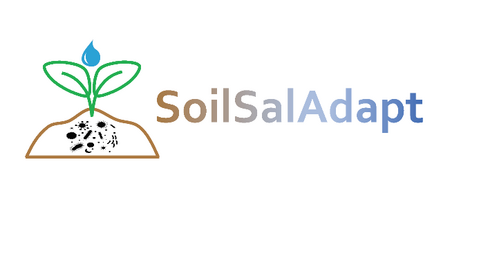SoilSalAdapt
| Start: | 21 March 2022 (External Call project) |
| Duration: | 36 |
| Aim: | Preadapting soil biology for increased tolerance to elevated salinities due to climate change |
| Contact: | Coordinator Prof. Matthew Goddard, University of Lincoln, United Kingdom |

Robust and stable societies and economies require reliable supplies of food. There is significant concern over the sustainability of food systems globally, and climate change is decreasing the stability of food production due to rising sea-levels and increasingly unpredictable weather events with greater extremes.
Project partners
Country | Organization |
Norway | Norwegian Universtiy of Life Sciences |
Portugal | Instituto Nacional de Investigação Agrária e Veterinária, I. P. |
Call text
Robust and stable societies and economies require reliable supplies of food. There is significant concern over the sustainability of food systems globally, and climate change is decreasing the stability of food production due to rising sea-levels and increasingly unpredictable weather events with greater extremes.
Saltwater contamination is already a major contributor to agricultural soil degradation in arid areas where it decreases crop yields. In temperate coastal areas fresh ground water sits on top of deeper saline sea water. Dry periods mean the freshwater level falls closer to the saline water, which is rising as sea levels rise. This means ground water is becoming increasingly brackish making it very hard to source fresh water for irrigation which is essential to produce high value staple crops. Growers are faced with either: 1) irrigating with much more expensive treated tap water (using tap water also competes with domestic and industry needs); or 2) not irrigating which significantly increases the chance of crop failure. This means either increases in food prices or decreases in the amount of food produced.
Growers are therefore increasingly forced to use the part-saline ground water for irrigation in summer, but the short- and long-term effects of this for agricultural soils and crops in temperate areas are poorly understood. Soil bacteria, fungi and invertebrates are key to soil fertility as they drive nutrient cycling, but very little is known about how soil organisms respond to increased salinity. Previous work by the applicants and others show that saline irrigation affects soil communities, and that soil organisms from saline soils are more tolerant to salt than those from non-saline soils. This leads to the prediction soil organisms can adapt to changes in soil salinity.
We will tests whether Darwinian selection processes can be reliably used to ‘push’ soil biological communities to become increasingly tolerant of saline conditions by the process of adaptation. This may be achieved by the prior use of part-saline irrigation to sort and select for more tolerant soil organisms more gradually. We will test a range of saline concentrations to evaluate how this works, and measure and predict the various impacts of this approach at three scales. At the micro-scale the NO partner will focus on the effects on the rhizosphere using dedicated ‘Rhizobox’ chambers. The UK partner will look at medium-scale pot to whole field-scale changes in total soil biodiversity and function by R&DNA sequencing and compare the fertility of soils that either have or have not been prior irrigated with various saline concentrations at sites in the UK and Portugal. We will also measure any cost of saline irrigation and adaption on soil fertility and biological function, and how long any effects last. Lastly, the landscape-scale impacts of increased salinity will be modelled by the PT partner, to predict the European and global extent of the issue, provide projections of the levels of soil salinity under future climate conditions, and identify the utility of these management practices to counter salinization and conserve the soil functions.
If soils can ‘learn’ to tolerate saline irrigation through more gradual biological adaptation, this means growers may condition soils to remain fertile despite the use of saline irrigation and manage this increasingly pressing issue. This will simultaneously increase food supply and reduce agricultural freshwater use, especially in dry periods.
The applicants are a partnership of academic and industry members and have strong experience with experimental evolution, soil experiments, saline irrigation, and have pioneered the use of DNA sequencing to evaluate biological communities in agricultural systems. This work will understand the science behind changed soil salinity to inform management solutions and help to maintain food supply in the face of climate change.